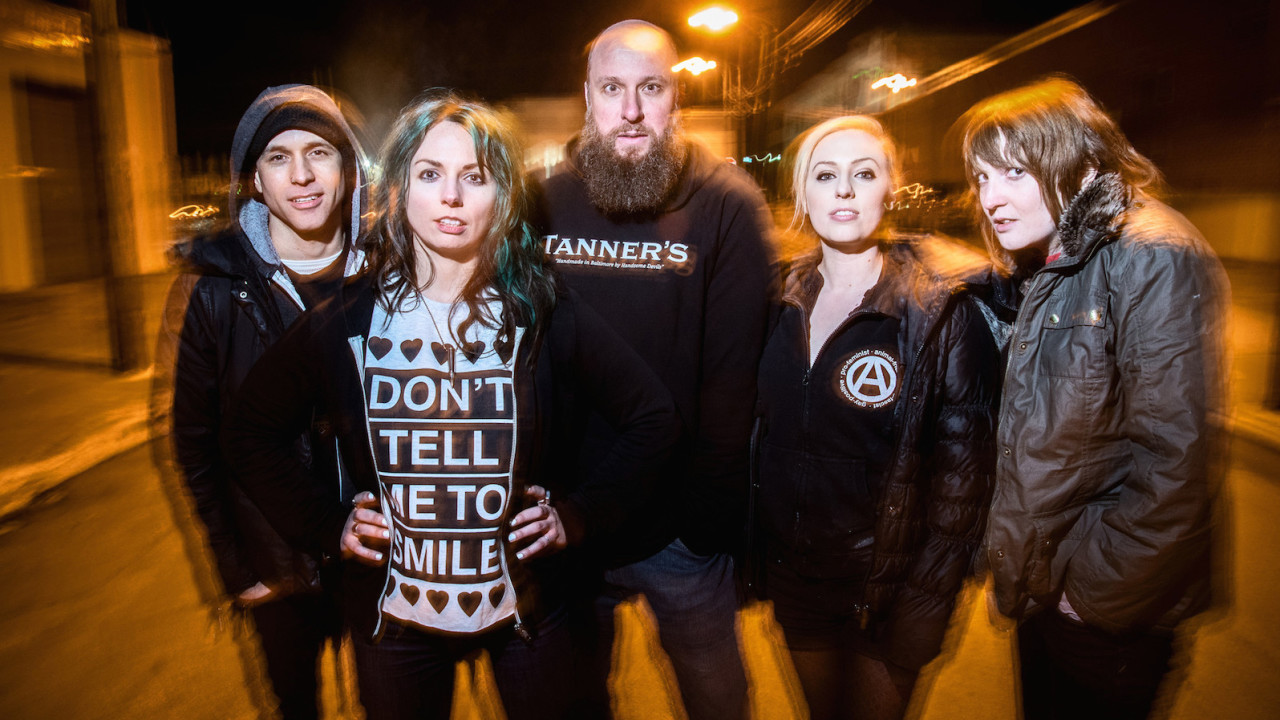In 1992, while most of the world was preoccupied with the emergence of grunge, on the underground, riot grrrls had just started screaming “Revolution Girl Style Now!” These young women went out of their way to carve out their own genre, having grown frustrated with violence in mosh pits, a lack of female voices in punk, and their own daily experiences of sexism and male-on-female violence and intimidation. The riot grrrl scene wasn’t just impactful at the time; its influence continues to be felt. And if it wasn’t for riot grrrl, one of the most compelling new hardcore bands in America – War On Women – wouldn’t exist.
“I was in a short-lived Bikini Kill cover band,” says War On Women frontwoman Shawna Potter, “for fun, for something else to do. It was just different…”
Potter had been playing in a rock band called Avec, with her guitarist friend Brooks Harlan; a project, she explains, “that we did for a long time without anyone giving a shit, we poured our heart into it.” The Bikini Kill cover band was merely a side project in which Potter could pay homage to a scene that had meant a great deal to her growing up. Then one day, as Avec’s touring schedule slowed and the band began looking at other options, Harlan witnessed Potter’s impassioned performance in the Bikini Kill cover group, had a momentary revelation and said “We should just do that… but for real.”
Potter – an active member of Hollaback!, an organization that assists women with tackling street harassment and sexual assault – realised that all of the issues women had been facing in the early 1990s – reproductive rights, sexism in the work place, a lack of female musical role models, and more – were still just as problematic in 2012.
“After that,” Potter says, “I started writing lyrics that had an obvious feminist bent.”
Brooks and Potter immediately sought out bandmates from the fertile Baltimore punk scene. “There really are a lot of musicians in Baltimore,” Potter explains, “so it was basically, ‘Who is willing to be in a band, where Shawna’s yelling about abortion rights? If that’s cool with you, let’s do this.’”
The quintet – completed by drummer Evan Tanner, bassist Rusty Haynie and guitarist Nancy Hornburg – quickly put out an EP titled Improvised Weapons; six no-holds-barred and sometimes shocking hardcore songs, distinguished by a visceral metal guitar sound and Potter’s enraged commentary about street harassment (Broken Record), female sexual equality (Effemimania) and other women’s issues.
Earlier this year, War On Women’s self-titled debut album – a more polished, but just as powerful effort – was released through Bridge9 Records. The cover art – a conveyor belt of babies emerging from a factory sets the tone for the entire thing.
“For me, it symbolises how society really only values women as mothers,” Potter explains, “telling women that being a mother is the most important thing you could ever do. And I think that really limits women’s individuality and ambition and it keeps restrictions on all reproductive healthcare and rights. It seems like the goal in the U.S. is for politicians to keep women constantly pregnant – because if we’re pregnant all the time then we can’t protest all the bullshit that they’re constantly trying to get away with.”
At their live shows, the members of War On Women are careful to be as inclusive as their music would suggest. Giving out free tampons, condoms and information for sexual assault helplines at every town they hit. “We’re realising that [our music] can be something that’s triggering to someone,” Potter says. “We hope it’s cathartic – that’s actually the intent behind it; just to be experiencing this moment with us. The idea that punk and hardcore are supposed to not be as sexist as other genres is kind of… innocent. I mean, white men are still in charge of it, just like everything else.”
War On Women are out to change that, one stage at a time.
For more information on War On Women, check out their official Facebook page.
